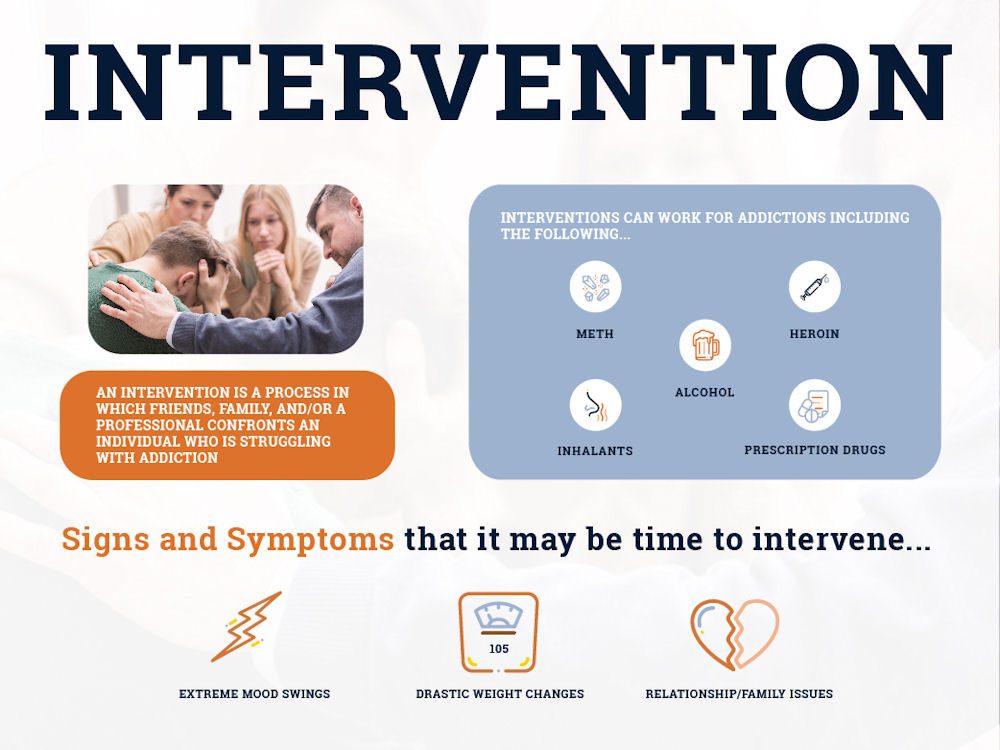Intervention Services in Illinois


There are many reasons why a person may be reluctant to accept help when it comes to a substance use disorder. They might not believe they have a problem, be in denial, or be afraid to change. Others may not want to face the shame and stigma associated with addiction. Whatever the reason, an intervention can help a person see that they need to get help and make changes in their life.
Addiction treatment enables individuals with a substance use disorder to live life to the fullest, free from the negative consequences of drugs and alcohol. Here at Northern Illinois Recovery Center, we provide addiction treatment that can break the cycle of addiction. Before we cover our service offerings, we will answer the question: what is an intervention?


What is an Intervention?
An intervention is a process in which friends, family, and/or a professional confronts an individual who is struggling with addiction. The people who are involved in an intervention may even include coworkers, colleagues, and others who are concerned about the addicted individual.
The people involved in an intervention lovingly and firmly address the individual on a united front. During an intervention, those who are closest to the individual struggling with addiction share stories about how the person’s drinking or drug use has negatively impacted their shared relationship. This can work for several addictions including addictions to the following substances:
- Alcohol addiction
- Cocaine
- Heroin
- Meth
- Prescription drugs
- Opiates and opioids
- Benzodiazepines
- Inhalants
The idea is for this to help the addicted individual see how their substance use disorder is affecting their lives and those who are closest to them. Often, when someone is in the throes of addiction, it is difficult to see past the cravings and need to abuse substances. An intervention can open the individual’s eyes so they can acknowledge they need help.
How is an Intervention Different from Addiction Treatment?
In addiction treatment, different services may be referred to as interventions. These therapeutic approaches (or therapeutic interventions) can include services such as individual therapy, group therapy, and holistic therapies. These are different from the term “intervention.”
An intervention is an organized attempt to bring an addiction to a loved one’s attention. It is not technically a treatment. Instead, it is often the first step before treatment. Once a person has acknowledged they have a problem, they can accept the help they need.
When is an Intervention Necessary?
It can be difficult to know when an intervention is necessary. This is especially true if you are already asking: what is an intervention? Part of the reason for this is that addiction causes changes in behavior that are not always obvious until it is too late. These changes can be so subtle that they go unnoticed until they become severe.
If you suspect someone close to you is struggling with addiction, there are signs that you can look for. Some of the signs that an intervention may be necessary include:
- Extreme mood swings
- Drastic weight changes, such as losing a lot of weight very quickly
- Increasing self-imposed isolation
- Long absences with no explanation of where they sent
- Lying, deceitfulness, secretiveness, or stealing
- Breakdown in family relationships and friendships
- Unexplained financial problems, constantly asking for money
- Sudden inability to hold a job; high amount of work or school absenteeism
- Changes in social circles, hanging out with people who drink excessively or use drugs
In addition to the signs of addiction, your loved one may be struggling with a co-occurring mental health condition. This can also cause a person to neglect to seek treatment, requiring the need for an intervention. Unfortunately, mental health disorders are very common in individuals who are experiencing addiction. While this can make treatment a little more intensive, dual diagnosis treatment is available to help a person overcome both disorders.
What Does an Intervention Entail?
The intervention process usually begins with a family member or friend contacting an interventionist. The interventionist will then assess the situation to see if an intervention is necessary. If they determine that it is, they will work with the family to develop a plan. This plan will involve identifying what the goals of the intervention are, and what role each person will play.
When it comes to creating an intervention plan, there are a few different types of intervention that can be conducted. An interventionist can help you decide which type will be the most effective for your loved one. Regardless of the type of intervention performed, it will be an approach that best fits the needs of your loved one.
A few different types of intervention include the following:
The Johnson Method
This method is the oldest and most popular intervention model. The Johnson method was developed in the 1960s by an Episcopal priest and recovering addict, Dr. Vernon Johnson. After studying 200 recovering alcoholics, he determined that a well-laid-out plan was what people with a substance use disorder needed to understand the consequences of addiction.
He was also one of the first to promote the caring involvement of family in interventions. That is apparent when it comes to the fact that this intervention model emphasizes confronting someone in a way that will not raise their defenses. In this method, each person on the intervention team composes a letter that explains how the addict’s behavior affects them. This combined with clear consequences if they avoid help is essential for this method.
The Systemic Family Intervention
This method focuses on how addiction affects the family as a whole. In this type of intervention, all members of the family learn about addiction and what they can do to change things. They also establish clear boundaries and consequences for the addict’s behavior. This type of intervention generally takes longer than others, but it can be very effective in healing the entire family.
The systemic family method helps families accomplish several goals. This includes establishing new family norms, boundaries, communication styles, and operating systems. Families also benefit from identifying and developing new healthy coping mechanisms. Additionally, this method involves didactic therapy and interactive work that examines generational patterns within the family.
Field Model of Intervention
The field model of intervention is a newer model that has been developed specifically for families with loved ones who are addicted to drugs or alcohol. This model is unique in that it offers crisis intervention if it is needed.
The field model of intervention provides resources and support for the family before, during, and after the intervention. If the family believes that their loved one is a danger to themselves or others, the interventionist can help.
The interventionist will assess the situation and decide if a crisis intervention is necessary. If it is, they will work with the family to ensure that the intervention is successful and that their loved one gets the help they need. After the intervention, the field model of intervention provides follow-up support for the family.
Steps in the Intervention Process
If you are wondering: what is an intervention, you may also be interested in learning about the steps in the intervention process. If you decide that your loved one requires an intervention, these listed steps are necessary to help you prepare to confront your loved one.
Research Treatment Options
When your loved one agrees to enter treatment, you will need to present treatment options. It is best to already have a treatment center in mind.
If you are unsure what treatment option would be best for your loved one, our admissions specialists can help. Here at Northern Illinois Recovery Center, we offer a range of programs and services for individuals who are ready to overcome addiction. Our programs include the following:
- Detox
- Residential Treatment
- Partial Hospitalization Program
- Intensive Outpatient Program
- Sober Living Program
- Aftercare Program
- 12-Step Program
- Medication Management Program
- Medication-Assisted Treatment
- Recovery Coaching Program
- Telehealth
- Dual Diagnosis Treatment
The best addiction treatment option for your loved one will depend on a few different factors. This includes the severity of their addiction, how long they have been struggling, any underlying mental health disorders, and more. Fortunately, our admissions specialists can help you determine what level of care is best for your loved one.
Put Together an Intervention Team
An intervention team will consist of the people who will be confronting the addicted individual. It is important to choose people who are close to the individual and qualified to speak about their experiences with the fallout from their addiction. This group can include friends, family, co-workers, clergy members, and more. Everyone on the team must be committed to taking action and willing to follow through with any aftercare treatment that is recommended.
Choose an Interventionist
An intervention is a conversation between you and your loved one about their addiction. This conversation is usually facilitated by a professional interventionist. Therefore, the next step is to choose an interventionist.
When deciding to employ an interventionist, there are a few ways to go about it. The most important part is that you find someone who is qualified and has experience leading interventions. You can ask for referrals from treatment centers, look online, or ask people in similar situations for recommendations.
Prepare Consequences
After you have chosen an interventionist and gathered a support team, it is time to start thinking about the consequences you will enforce if your loved one refuses treatment. While you do not want to punish your loved one, they need to understand that they must be held accountable for how their actions affect others and themself.
Some consequences can include the following:
- Losing privileges such as driving
- Not being given money when they ask
- Moving out if they continue to use
Seek Support
If you are staging an intervention, you have likely been dealing with your loved one’s behavior for a while. This can be mentally taxing and emotionally draining. It is important that you also seek support for yourself. Talk to friends or family about what you are going through and how they can help support you. You may also want to consider attending Alcoholics Anonymous or Narcotics Anonymous meetings. These are groups for families and friends of addicts that provide support and guidance on how to deal with addiction.
What Comes After the Intervention?
Not only is it important to understand what is an intervention, but it is also crucial to know what comes next. After the initial intervention for alcoholism or intervention for drug addiction, comes addiction treatment. Many times, the person who is struggling with addiction will be asked to go to an inpatient treatment center. This is where they will receive around-the-clock care and support. Inpatient treatment centers provide a safe and structured environment for people to detox from drugs and alcohol and begin their journey to recovery.
Before starting an inpatient or outpatient addiction treatment program, many people require medical detox. During medical detox, people are closely monitored by medical professionals as they go through the process of withdrawal. Withdrawal can be a difficult and uncomfortable experience, but it is important to detox in a safe and controlled environment.
After completing an inpatient or outpatient treatment program, it is important to continue to participate in some form of addiction aftercare program. These often include support groups and therapy. This will help the addicted individual stay grounded in their recovery.
Addiction Treatment with Northern Illinois Recovery Center


We can do more for you than just answer the question: what is an intervention? To learn more about our programs and how we can help, contact us today. The road to recovery has many steps, we are here to take those steps with you.
Get the help you need at Northern Illinois Recovery!
855.458.1739
Northern Illinois Recovery Addiction Treatment Center


Licensed Physician and Surgeon
Dr. Beth Dunlap, a board-certified addiction medicine and family medicine physician, and is the medical director at Northern Illinois Recovery Center. She is responsible for overseeing all the integrated medical services at both campuses. Beth completed medical school, residency, and fellowship at Northwestern University, where she continues to serve on the faculty as a member of the Department of Family and Community Medicine. She has extensive experience in addiction medicine at all levels of care, and her clinical interests include integrated primary care and addiction medicine, harm reduction, and medication-assisted treatment.



